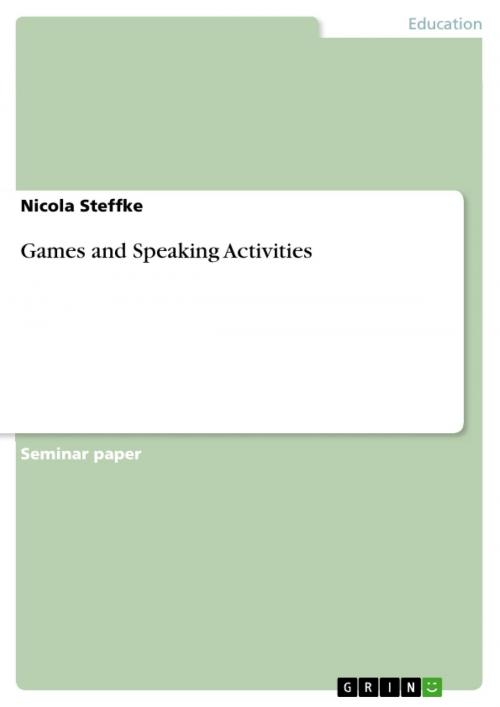| Author: | Nicola Steffke | ISBN: | 9783638509657 |
| Publisher: | GRIN Verlag | Publication: | June 13, 2006 |
| Imprint: | GRIN Verlag | Language: | English |
| Author: | Nicola Steffke |
| ISBN: | 9783638509657 |
| Publisher: | GRIN Verlag |
| Publication: | June 13, 2006 |
| Imprint: | GRIN Verlag |
| Language: | English |
Seminar paper from the year 2003 in the subject English - Pedagogy, Didactics, Literature Studies, grade: 1,3, LMU Munich (Institut für Englische Philologie), course: Theorie und Praxis der Unterrichtsgestaltung für Englisch an Gymnasien , 8 entries in the bibliography, language: English, abstract: This paper shows how important games and speaking activities in a foreign language learning class are. It first concentrates on a theoretical part. Why should games be part of every effective class? What positive outcome is to be expected with playing? What aspects are important in order to play successfully? Here special emphasis is set on the atmosphere in class. The following point includes the criteria for choosing a game. Various different factors have to be given deeper thought before you can even start planning the actual game. Often enough the major problems are not caused by the game itself but rather by class or time management. When all the preliminary problems are finally settled the chosen game will then have to be planned carefully always keeping in mind how it will be presented, how it will be carried out and how the topic of feedback will be treated. The second major part of this paper deals with actual games. A selection of nine games is presented and critically evaluated showing problems or weak points, but also giving hints for successful playing or variations on the games. Here the focus lies mainly on games that were played during didactics courses. The participants then were asked to give their own personal view on these games or add from their own experience. A brief summing up of the main points that were discussed is given. What is important is that all the presented games have actually been played successfully. The bibliography offers a more extensive list of game collections of different types and for different age groups. The main aim is to show that games are not simple time fillers or rewards but should be accepted as useful learning situations.
Seminar paper from the year 2003 in the subject English - Pedagogy, Didactics, Literature Studies, grade: 1,3, LMU Munich (Institut für Englische Philologie), course: Theorie und Praxis der Unterrichtsgestaltung für Englisch an Gymnasien , 8 entries in the bibliography, language: English, abstract: This paper shows how important games and speaking activities in a foreign language learning class are. It first concentrates on a theoretical part. Why should games be part of every effective class? What positive outcome is to be expected with playing? What aspects are important in order to play successfully? Here special emphasis is set on the atmosphere in class. The following point includes the criteria for choosing a game. Various different factors have to be given deeper thought before you can even start planning the actual game. Often enough the major problems are not caused by the game itself but rather by class or time management. When all the preliminary problems are finally settled the chosen game will then have to be planned carefully always keeping in mind how it will be presented, how it will be carried out and how the topic of feedback will be treated. The second major part of this paper deals with actual games. A selection of nine games is presented and critically evaluated showing problems or weak points, but also giving hints for successful playing or variations on the games. Here the focus lies mainly on games that were played during didactics courses. The participants then were asked to give their own personal view on these games or add from their own experience. A brief summing up of the main points that were discussed is given. What is important is that all the presented games have actually been played successfully. The bibliography offers a more extensive list of game collections of different types and for different age groups. The main aim is to show that games are not simple time fillers or rewards but should be accepted as useful learning situations.















